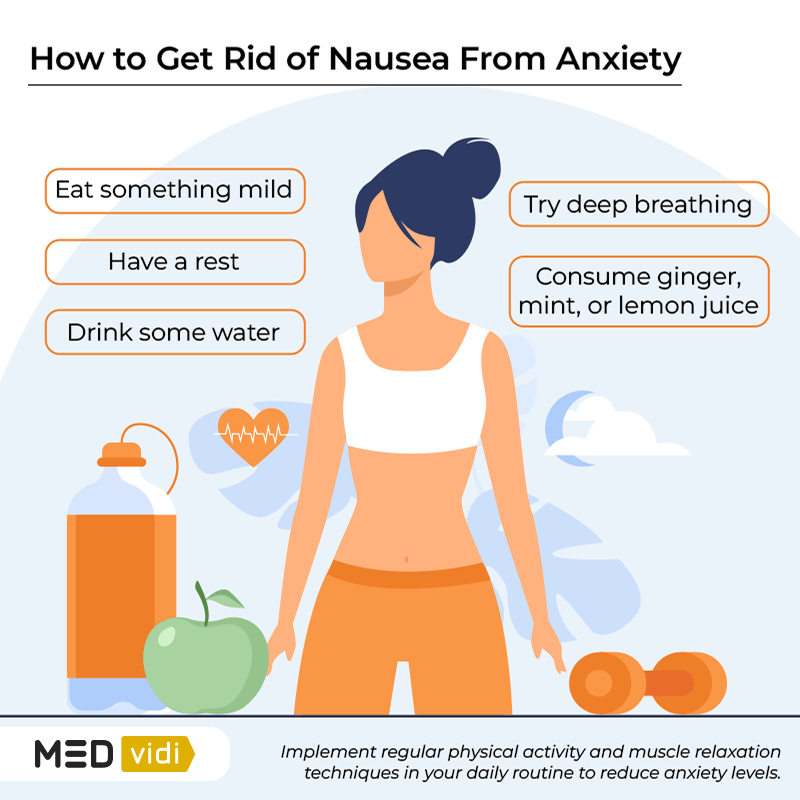Highlights
- Anxiety may cause nausea due to the body’s stress response and the gut-brain connection.
- Other anxiety symptoms like dizziness, sweating and a racing heart often accompany nausea from anxiety.
- Some ways to relieve anxiety-related nausea are deep breathing techniques, gentle exercise, and dietary adjustments.
- If you experience severe nausea from anxiety, see a healthcare provider for evaluation and personalized treatment.
Approximately
Find out how anxiety can impact your digestive system and cause nausea, and how you can manage it.
Can Anxiety Cause Nausea or Vomiting?
Many factors can cause nausea, and anxiety is one of them. People with generalized anxiety disorder (GAD), panic disorder, post-traumatic stress disorder, and social anxiety can experience this symptom.
Your brain and your stomach are more connected than one may think. This connection is why you may feel a pit in your stomach when you receive bad news, or suddenly get “butterflies” right before an important event. Once the perceived threat has passed, you may feel better.
Why Does Anxiety Cause Nausea?
Anxiety can make you nauseous for several reasons. Below are some of them.
The Gut-Brain Connection
While the exact science isn’t completely clear yet, there is a
One possible cause is disrupted activity of the
In addition, stress can alter gut permeability, contributing to the changes in gut microbiota. The conditions become more favorable for pro-inflammatory bacteria, which can cause discomfort.
Fight-or-Flight Response
Whenever your brain senses danger, your body can enter fight-or-flight mode. During the fight-or-flight response,

Hyperventilation and Muscle Tension
Anxiety can also cause you to breathe more rapidly, leading to hyperventilation and increasing your dizziness or nausea symptoms. Your muscles may also tense when you’re feeling anxious, and abdominal muscle tension may contribute to discomfort. In general, the intensity of your symptoms depends on your body and how you react to stressful events.
How to Tell If Nausea Is From Anxiety
Nausea is a symptom associated with many conditions. To determine if it’s anxiety-related, it’s important to consider the following:
- Symptoms: Does your nausea appear alongside other anxiety symptoms like excessive worrying, shortness of breath, trembling, or a racing heart?
- Timing: Do you experience nausea when you’re feeling stressed or anxious?
- Persistence: Do your stomach issues and nausea disappear after the anxiety-inducing situation is over?
Sometimes, it can be difficult to tell if your nausea is related to anxiety or something else altogether. If you are still unsure, keep a record of your symptoms, their duration, and when they occur to help you determine their underlying cause. If your symptoms are prolonged, see a healthcare provider for a comprehensive health assessment.

What Does Anxiety Nausea Feel Like?
For many people, anxiety-related sickness feels just like nausea due to any other reason. It may feel like butterflies, an upset stomach, or a fluttering feeling. An important thing to remember about anxiety-induced nausea is that it is usually short-lived and often occurs alongside additional symptoms like:
- Nervousness or restlessness
- Inability to focus on anything but your worries
- A sense of doom or impending danger
- Racing heartbeat and increased blood pressure
- Hyperventilation or rapid breathing pattern
- Trembling and sweating
- Difficulty sleeping
- Fatigue
- Muscle tension
Remember, just because you experience nausea when you’re anxious doesn’t mean you necessarily have
Anxiety-Induced Nausea vs. Other Causes
Nausea can stem from several issues, which is why it’s important to correctly identify the reasons behind your stomach discomfort. Some other potential causes of nausea that aren’t necessarily related to anxiety include:
Acid reflux and stomach acid[7] - Food poisoning
- Irritable bowel syndrome
Motion sickness[8] - Stomach virus
Chemotherapy[9] Migraines[10] Intestinal obstruction[11] Pregnancy[12]
Additionally, some medications may cause nausea as a side effect. If you are unsure whether your nausea is anxiety-related or due to something else, contact your doctor. They can conduct a thorough assessment to determine the cause of your nausea and provide you with appropriate treatment options.
How to Get Rid of Nausea From Anxiety and Stress
Chronic nausea due to anxiety can significantly disrupt your productivity and quality of life. If you are struggling, there are several things you can try to regain control and reduce the severity and frequency of your symptoms.

Deep Breathing Exercises
Box breathing and belly breathing may be helpful ways to address anxiety and reduce nausea symptoms when they flare up. To try box breathing, breathe in slowly and count to 4. Then, hold this breath for 4 seconds before slowly exhaling to the count of 4. After exhaling, hold for four more seconds and then repeat the process until you feel calmer.
To try belly breathing, lie down comfortably. Once settled in, place one hand on your stomach and the other on your chest. Then, concentrate and bring your breath into your belly. You should only feel the hand resting on your belly rise as you inhale. Then, slowly exhale. You should only feel the hand resting on your stomach fall. Repeat until you feel more relaxed and your anxiety symptoms decrease.
Journaling
Journaling is a helpful way to reduce rumination, process your emotions, and gain clarity. There is also
Mindfulness Practices
Anxiety symptoms like nausea and excessive worry can be hard to break free from. With mindfulness, you can reduce rumination and bring awareness to the present moment. This, in turn, can reduce the intensity of your emotional and bodily symptoms, including nausea. When you practice
Progressive Muscle Relaxation
Cognitive-Behavioral Strategies
Cognitive-behavioral therapy can be an effective way to treat an anxiety disorder and reduce associated symptoms. If you experience anxiety most days and find it difficult to navigate daily life without your symptoms getting in the way, talk therapy can help. A professional therapist will help you explore different ways to manage your anxiety. Your plan may include individual counseling, medication, or a combination of both.
In addition to these tips, making positive lifestyle changes can significantly decrease your anxiety symptoms, including nausea. Establish
Is There a Medication for Anxiety Nausea?
If nausea is persistent or intense, and first-line solutions like hydration, relaxation, and talk therapy are not helpful enough, your healthcare provider may recommend medication.
- Anti-Nausea Medication: Over-the-counter options like Dramamine or Pepto-Bismol may be the first-line choice. However, prescription medications like prochlorperazine, ondansetron, or others can be chosen, depending on your particular situation.
- Anti-Anxiety Medication: Selective serotonin reuptake inhibitors (SSRIs), benzodiazepines, and beta-blockers are the most common medications for anxiety treatment.
The choice of medication depends on many factors, including your symptoms, your health history, previous response to certain medicines, etc. Also, note that medication works more effectively when it’s combined with lifestyle improvements and therapy.
It’s important to consult a healthcare professional and follow their instructions. At MEDvidi, you can see a licensed medical provider for online anxiety treatment and receive personalized support and medication prescriptions, if deemed necessary.
When to Seek Professional Help
If anxiety-related nausea is interfering with your daily life, you may want to seek professional help. Your provider will help determine whether you have an anxiety disorder, as well as find the root of your anxiety and nausea. Based on the result of your evaluation, you may be referred to a psychotherapist who uses cognitive-behavioral techniques and/or receive a medication prescription, if appropriate.
Takeaway
While nausea caused by anxiety can disrupt your day-to-day life, it is manageable with the right treatment strategies and support. Learning healthy ways to manage stress, reframing your thoughts, staying grounded during difficult situations, and taking medication if necessary can help you cope with the symptoms. Book an appointment at MEDvidi today to have a comprehensive mental health assessment and receive an individualized treatment plan for anxiety.
FAQs About Anxiety and Nausea
Can you throw up from anxiety?
Yes, anxiety may lead to vomiting, especially during moments of extreme stress or
How long does anxiety-induced nausea last?
Can stress and anxiety cause nausea every day?
Is it normal to throw up blood when stressed?
A small amount of blood in your vomit may be due to the irritation or trauma caused by forceful vomiting. However, it can also indicate a more serious underlying condition. You should seek medical attention immediately if you vomit blood, especially if other symptoms are present, such as dizziness, weakness, and abdominal pain.
What can you eat to relieve anxiety and nausea?
If you’re experiencing anxiety-induced nausea, try eating small amounts of bland foods that are easily digestible. Some options include toast, crackers, rice, and potatoes.
Can subconscious anxiety make you sick?
Yes, subconscious anxiety can make you feel sick and can manifest through physical symptoms like headaches, nausea, and stomach pain.











